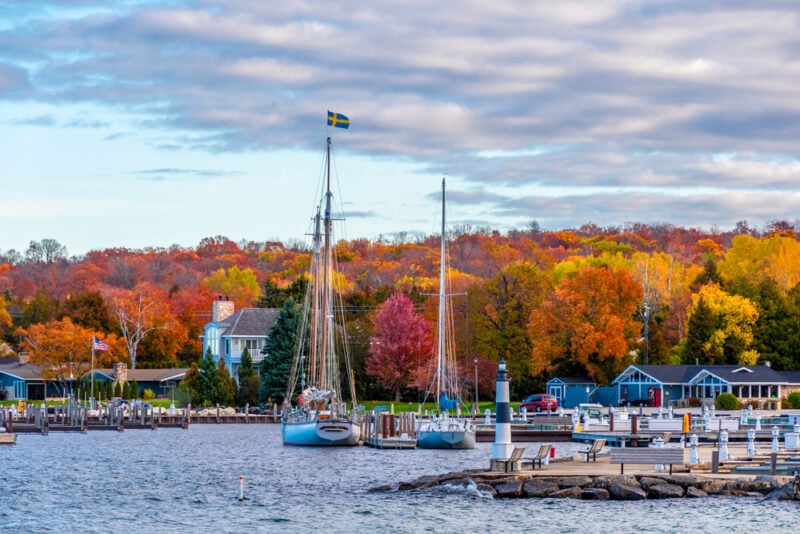The 30 Richest Places to Live in New Hampshire: The State’s Most Affluent Communities
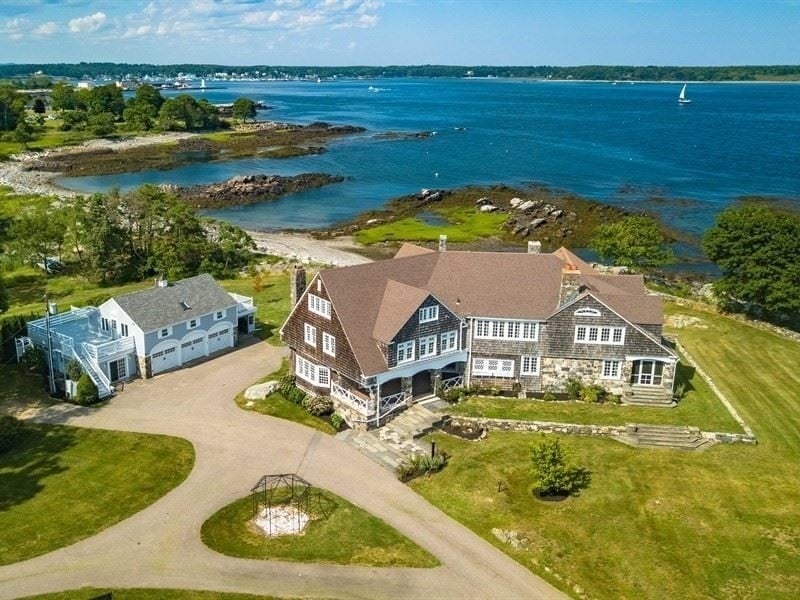
New Hampshire ranks among the most prosperous states in New England, featuring numerous affluent communities that combine natural beauty with economic success.
The state’s wealthiest areas span from coastal enclaves along the seacoast to charming towns near prestigious institutions like Dartmouth College.
These thirty richest places represent diverse communities where residents enjoy higher median incomes, strong real estate values, and exceptional quality of life.
The most affluent New Hampshire communities typically cluster in three main regions: the Seacoast area, the outer Boston suburbs, and areas surrounding major educational institutions.
From New Castle’s waterfront luxury to Hanover’s academic prestige, each location offers unique advantages that attract high-income residents and maintain strong property values.
Here are the 30 richest places to live in New Hampshire:
1. New Castle
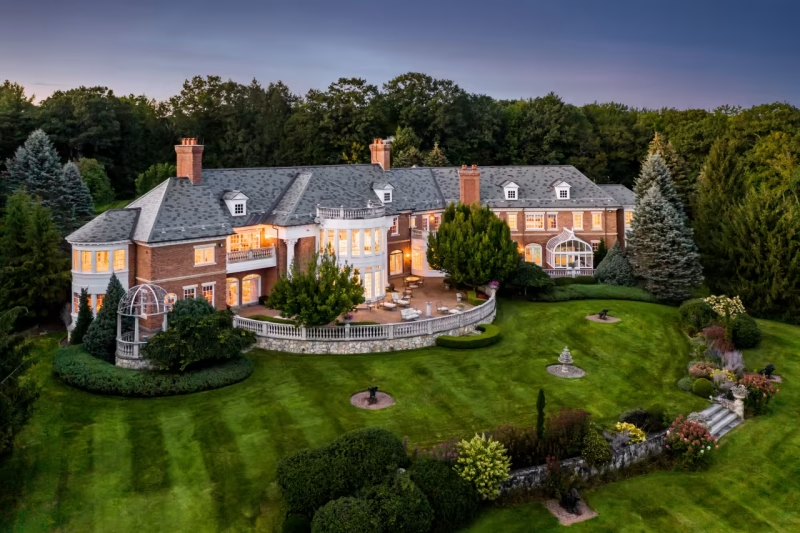
New Castle stands as New Hampshire’s wealthiest community with an average income of $338,436. This coastal town has experienced remarkable growth since 2020.
The community saw an 89% income surge over five years following the pandemic. This dramatic increase outpaced most other affluent New Hampshire towns.
New Castle offers residents stunning ocean views and peaceful neighborhoods. The town combines natural coastal beauty with small-town charm.
Average family income reaches approximately $270,111 annually. The area features some of the state’s most expensive residential properties.
Historical attractions include the Wentworth by the Sea Hotel and Fort Constitution Historic Site. These landmarks add cultural value to the community.
The town attracts residents who prioritize tranquility and scenic waterfront living. Its location provides both privacy and proximity to regional amenities.
2. Hanover
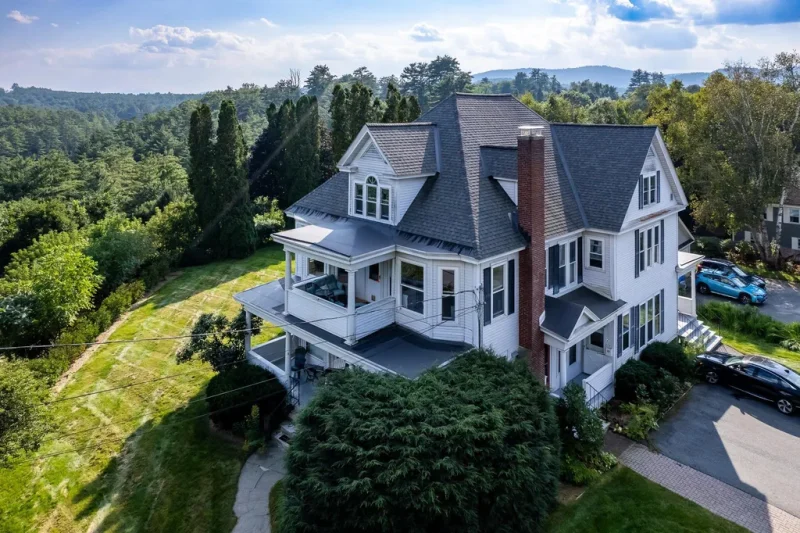
Hanover stands as New Hampshire’s wealthiest city with a population exceeding 5,000 residents. The town reports an average household income of $226,023 as of 2023, significantly above the state median.
Home to Dartmouth College, Hanover benefits from the economic stability that comes with a prestigious university presence. The institution attracts highly educated professionals and contributes to the area’s cultural richness.
The median household income reaches $111,958, while the poverty rate remains notably low at approximately 10.5%. These figures reflect the community’s overall financial strength.
Hanover’s location in Grafton County places it among New Hampshire’s most affluent regions. The town combines academic prestige with strong economic fundamentals, creating an attractive environment for wealthy residents.
Cultural amenities including theaters, museums, and educational facilities enhance property values throughout the area.
3. Bedford
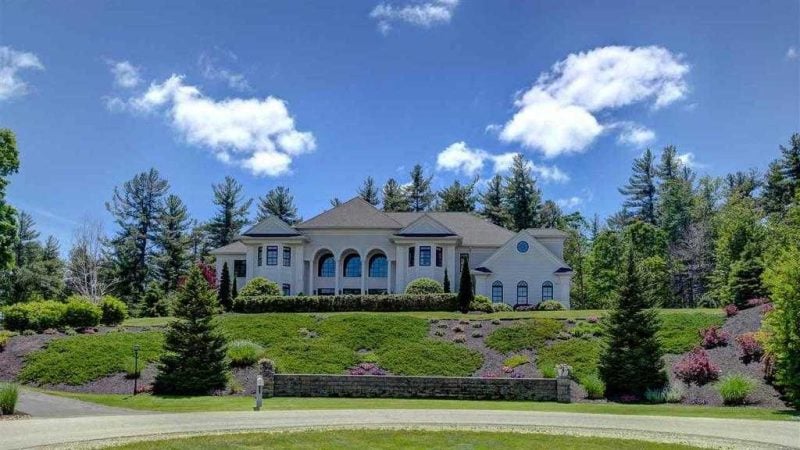
Bedford stands out as one of New Hampshire’s most affluent communities. The town attracts wealthy residents with its upscale neighborhoods and premium amenities.
Located in southern New Hampshire, Bedford offers convenient access to both Manchester and the greater Boston metropolitan area. This strategic location makes it popular among high-earning professionals.
The town features excellent public schools that consistently rank among the state’s best. These educational opportunities draw families willing to pay premium prices for quality schooling.
Bedford’s real estate market reflects its wealthy status. Home values significantly exceed state averages, with many properties featuring large lots and luxury amenities.
The community maintains well-funded municipal services and recreational facilities. Residents enjoy access to parks, sports complexes, and cultural programs that enhance quality of life.
Bedford’s combination of location, schools, and amenities creates strong demand among New Hampshire’s wealthiest residents.
4. Windham
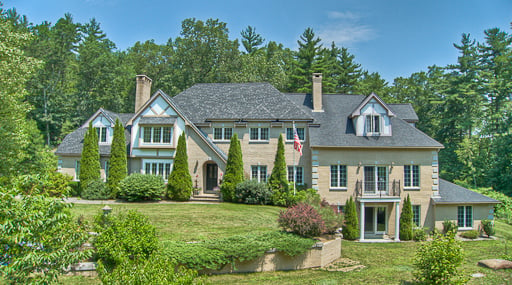
Windham stands as one of New Hampshire’s most affluent communities in Rockingham County. The town maintains a median household income exceeding $173,000, consistently ranking among the state’s wealthiest areas.
This suburban community attracts families seeking quality education and outdoor recreation. Windham offers excellent schools that draw residents prioritizing academic excellence for their children.
The town features numerous parks and lakes that provide outdoor activities year-round. These natural amenities contribute to Windham’s appeal among affluent residents seeking recreational opportunities.
Windham’s location provides convenient access to major employment centers while maintaining a suburban atmosphere. The combination of strong schools, natural beauty, and high incomes makes it a desirable destination for wealthy families in New Hampshire.
5. Rye
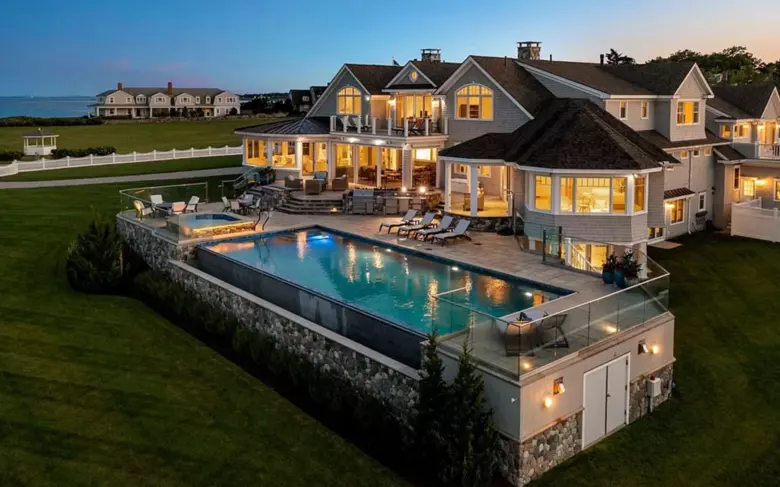
Rye stands out as one of New Hampshire’s most prestigious coastal communities. The town features sprawling oceanfront properties that command premium prices in the real estate market.
Located along the scenic seacoast, Rye attracts wealthy residents seeking luxury waterfront living. The community offers direct access to pristine beaches and stunning ocean views.
High-end real estate dominates the local market. Many properties feature expansive lots with private beach access and custom-built homes designed for affluent buyers.
The town’s location provides easy access to both Portsmouth and the greater Boston metropolitan area. This proximity makes it attractive to professionals and executives seeking upscale coastal living.
Rye’s reputation for exclusivity continues to drive property values higher. The combination of limited coastal land and high demand ensures the community remains among New Hampshire’s wealthiest areas.
6. Lyme
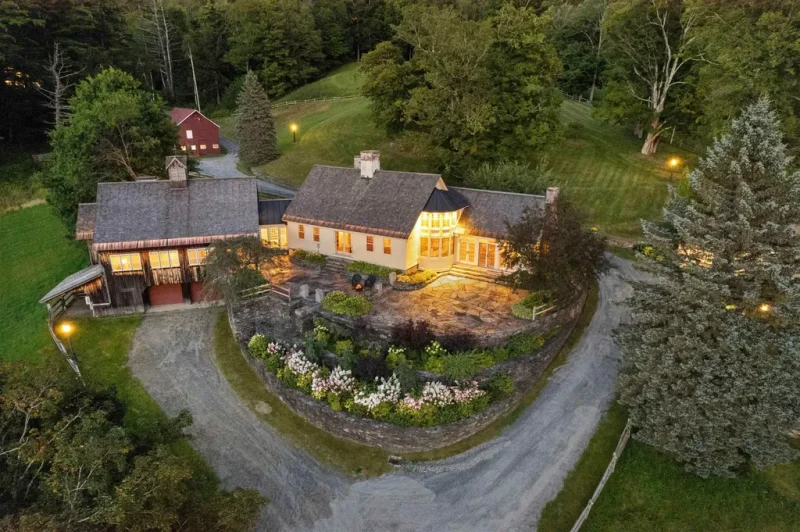
Lyme stands as one of New Hampshire’s most affluent rural communities, nestled in the Connecticut River Valley of Grafton County. The town attracts wealthy residents seeking a blend of natural beauty and proximity to Dartmouth College in nearby Hanover.
The community features expansive properties with impressive real estate values. Many homes sit on large lots with scenic views of the Connecticut River and surrounding hills.
Lyme’s residents enjoy excellent schools and low crime rates. The town maintains its rural character while offering easy access to cultural amenities in Hanover.
The area’s wealth stems partly from its proximity to Dartmouth College, which brings educated professionals and academics to the region. Many residents work in higher education, healthcare, or professional services.
Property values in Lyme consistently rank among the highest in the state outside of coastal areas.
7. Portsmouth
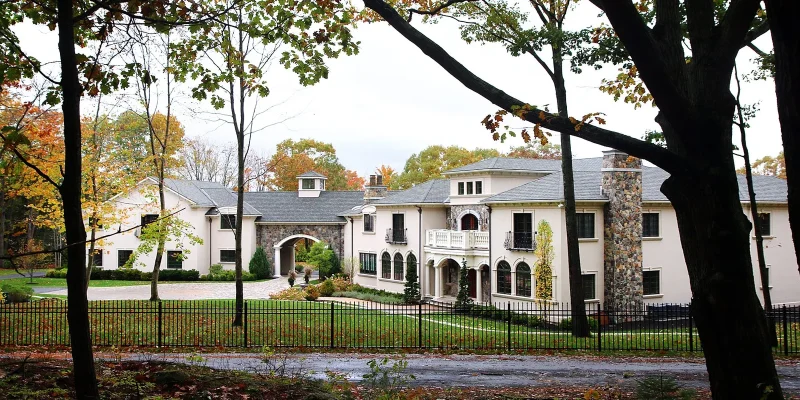
Portsmouth serves as the cultural and economic anchor of New Hampshire’s seacoast region. The city combines historic charm with modern prosperity, making it one of the state’s most desirable locations.
Home values in Portsmouth have experienced remarkable growth over the past fifteen years. Property values climbed from $313,262 in 2010 to $718,788 in 2025, representing a 129.45% increase.
The city’s historic downtown district contributes significantly to its appeal and property values. Cultural institutions including theaters, museums, and concert venues enhance the area’s desirability among affluent residents.
Portsmouth’s strategic location in the seacoast region attracts wealthy professionals and retirees. The combination of coastal access, cultural amenities, and historic architecture creates a premium living environment that commands high real estate prices.
8. Londonderry
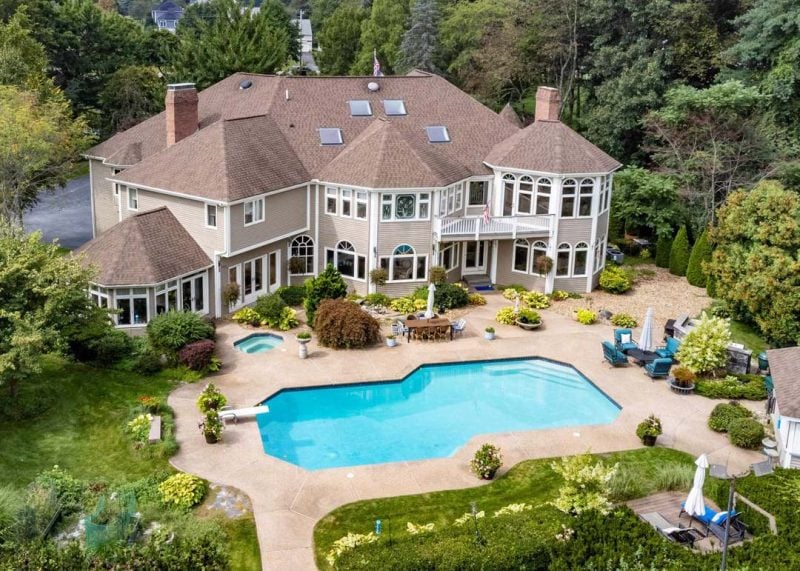
Londonderry stands as one of New Hampshire’s most prosperous communities, combining economic success with natural beauty. The town has established itself as a wealthy enclave through its strategic location and strong local economy.
Known for its historic apple orchards and scenic landscapes, Londonderry maintains a balance between rural charm and modern development. The community features well-developed infrastructure with contemporary amenities and thriving businesses.
The town’s wealth stems from its proximity to major employment centers and its appeal to high-income residents. Londonderry attracts families seeking quality schools, safe neighborhoods, and recreational opportunities.
Property values remain consistently high due to demand from affluent buyers. The town offers various community events and maintains excellent public services that contribute to its desirable reputation among New Hampshire’s wealthier communities.
9. Brentwood
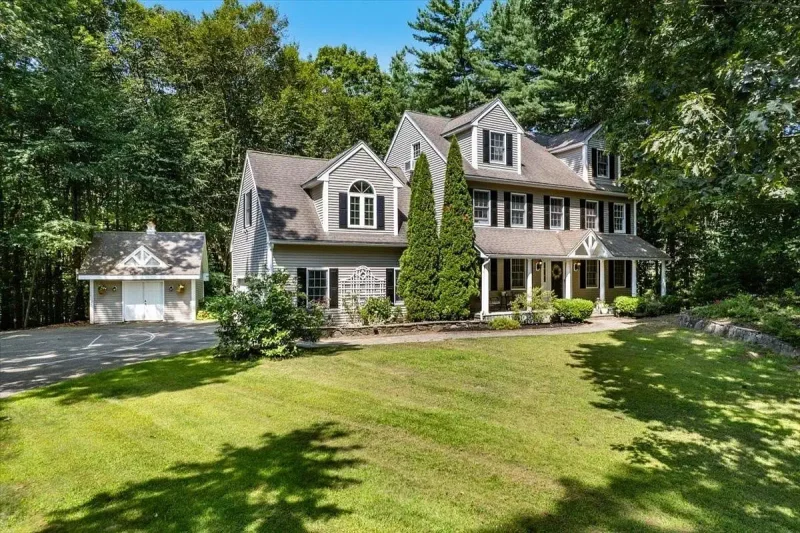
Brentwood stands out among New Hampshire’s wealthiest communities with home values significantly above the state average. The town’s real estate market commands premium prices that exceed New Hampshire’s average of $295,170.
This affluent community attracts buyers willing to pay substantially more for residential properties. Market analysis shows Brentwood homes cost considerably more than similar-sized cities across the region.
The town’s desirable neighborhoods reflect strong market demand from prospective residents. Property values indicate Brentwood ranks among the state’s most sought-after places to live.
Brentwood’s economic profile demonstrates the financial strength of its resident population. The community maintains its position as one of New Hampshire’s premium residential markets through consistent property value performance.
10. Manchester
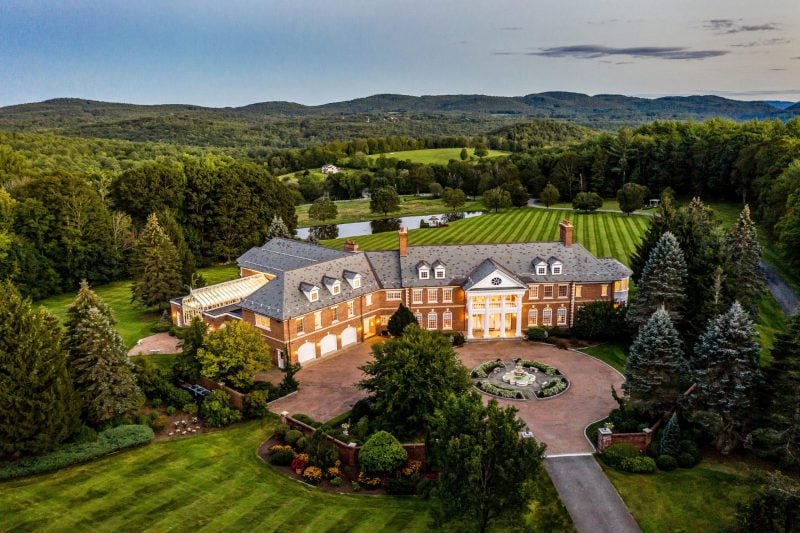
Manchester stands as one of New Hampshire’s most exclusive residential communities. This small town attracts wealthy residents seeking privacy and rural elegance.
The community features expansive properties with significant acreage. Many homes sit on lots exceeding ten acres, providing exceptional privacy for affluent families.
Manchester’s real estate market consistently commands premium prices. The town’s limited housing inventory contributes to sustained property values and exclusivity.
Residents enjoy access to outdoor recreational opportunities throughout the region. The town’s location provides convenient access to ski resorts and hiking trails.
The community maintains a distinctly rural character while attracting high-income professionals. Many residents commute to larger metropolitan areas for work while enjoying Manchester’s peaceful atmosphere.
Property taxes remain relatively moderate compared to some neighboring wealthy communities. This factor contributes to Weston’s appeal among discerning buyers seeking value in premium real estate markets.
11. Bow
Bow stands as one of New Hampshire’s most prosperous communities, located in Merrimack County just south of Concord. The town combines suburban amenities with rural charm, attracting affluent families seeking quality schools and spacious properties.
The median household income in Bow consistently ranks among the state’s highest. Residents benefit from excellent public schools and low crime rates.
Housing values reflect the community’s desirability, with many properties featuring large lots and modern amenities. The town maintains a strong tax base while preserving its small-town character.
Bow’s proximity to Concord provides easy access to employment opportunities while maintaining a peaceful residential atmosphere. The community features well-maintained neighborhoods and recreational facilities that appeal to wealthy residents.
12. Exeter
Exeter ranks among New Hampshire’s most affluent communities, drawing wealthy residents with its combination of historic character and high quality of life. The town sits in Rockingham County and maintains its appeal through well-preserved architecture and strong community amenities.
The median home value in Exeter exceeds $550,000, reflecting the area’s desirability and economic strength. This price point positions the town firmly within New Hampshire’s premium real estate market.
Exeter’s location provides residents with access to both rural charm and urban conveniences. The town offers excellent schools and recreational opportunities that attract families seeking upscale living options.
The community’s economic stability stems from its educated population and proximity to major employment centers. Many residents commute to nearby cities while enjoying Exeter’s small-town atmosphere and historic downtown area.
13. Newbury
Newbury sits along the shores of Lake Sunapee in central New Hampshire. This small town attracts affluent residents with its pristine lakefront properties and scenic mountain views.
The community features some of the state’s most desirable waterfront real estate. Many homes command premium prices due to their direct lake access and panoramic vistas.
Newbury’s location provides easy access to outdoor recreation year-round. Residents enjoy boating, swimming, and fishing during summer months, while winter brings skiing opportunities at nearby Mount Sunapee.
The town maintains a rural character with low population density. This exclusivity appeals to wealthy buyers seeking privacy and natural beauty.
Property values remain consistently high due to limited lakefront inventory. The combination of natural amenities and upscale housing stock solidifies Newbury’s position among New Hampshire’s most affluent communities.
14. Hampton
Hampton stands as one of New Hampshire’s premier coastal communities, combining beachfront living with substantial wealth. The town attracts affluent residents seeking oceanfront properties and seasonal retreats.
The community features some of the state’s most expensive real estate. Waterfront homes and estates command premium prices, reflecting Hampton’s desirable location along the Atlantic coast.
Hampton’s proximity to both Boston and Portsmouth enhances its appeal to high-income professionals. Many residents commute to these metropolitan areas while enjoying small-town coastal living.
The town offers excellent amenities including Hampton Beach, upscale dining, and recreational facilities. These features contribute to property values and attract wealthy seasonal residents.
Local schools maintain strong reputations, drawing families with substantial incomes. The combination of coastal lifestyle and quality education makes Hampton attractive to affluent households seeking both luxury and family-friendly environments.
15. Merrimack
Merrimack ranks among New Hampshire’s most affluent communities in Hillsborough County. The town sits along the banks of the Merrimack River, offering scenic waterfront living.
The median household income exceeds $110,000, placing it well above the state average. This income level reflects the community’s economic prosperity and desirability among residents.
Money Magazine recognized Merrimack’s quality of life by ranking it #23 in their “100 Best Places to Live” in 2013. The 2020 Census recorded 26,632 residents, making it the eighth largest incorporated municipality in New Hampshire.
The town attracts families and professionals seeking suburban comfort with access to employment centers. Merrimack provides a balance of residential amenities and business opportunities within its community structure.
16. Derry
Derry stands as one of New Hampshire’s notable affluent communities in the southern region of the state. The town benefits from its strategic location near the Massachusetts border, providing residents access to both New Hampshire’s tax advantages and employment opportunities in the greater Boston area.
The community features a median household income that places it among the state’s wealthier municipalities. Derry’s proximity to major highways makes it attractive to professionals who commute to nearby metropolitan areas while enjoying suburban living.
Real estate values in Derry reflect the town’s desirability among middle to upper-middle class families. The area offers quality public schools and recreational amenities that contribute to its appeal.
Derry maintains a balance between residential neighborhoods and commercial development. The town’s location provides convenient access to shopping, dining, and cultural attractions while preserving its community character.
17. Brookline
Brookline stands as one of New Hampshire’s most affluent communities with a median household income of approximately $133,000. This small town maintains a population of around 5,300 residents.
The community sits in Hillsborough County, positioned just west of Nashua. This strategic location provides residents with suburban tranquility while maintaining access to larger metropolitan areas.
Brookline’s wealth stems from its proximity to economic centers and its appeal to high-income professionals. The town attracts families seeking quality residential areas with strong property values.
The community’s small size creates an intimate atmosphere while supporting the high income levels that place it among the state’s wealthiest locations. Residents benefit from both the peaceful setting and the economic opportunities of the surrounding region.
18. Pelham
Pelham ranks among New Hampshire’s most affluent neighborhoods in the southeastern region near the Massachusetts border. The town attracts wealthy professionals with its combination of rural charm and upscale residential developments.
This desirable community benefits from its strategic location. Residents enjoy easy access to both New Hampshire’s natural beauty and Massachusetts employment opportunities.
The town features well-maintained neighborhoods with higher property values. Many homes sit on larger lots that provide privacy and space for affluent families.
Pelham’s appeal stems from its quiet atmosphere and quality amenities. The community maintains excellent schools and recreational facilities that support its upscale reputation.
The town’s proximity to major highways makes commuting convenient for professionals. This accessibility has contributed to steady demand from high-income buyers seeking suburban tranquility.
19. Durham
Durham stands as one of New Hampshire’s most prosperous communities, largely influenced by the University of New Hampshire’s presence. The town benefits from the academic institution’s economic impact and attracts faculty, staff, and professionals.
The median household income in Durham reflects its educated population base. University employees and researchers contribute significantly to the local economy and property values.
Real estate prices remain elevated due to limited housing supply and steady demand from university personnel. The town’s proximity to Portsmouth and the seacoast region adds to its appeal for affluent residents.
Durham offers excellent schools and maintains low crime rates. The community combines small-town charm with access to cultural and educational resources provided by the university.
The town’s location provides convenient access to both urban amenities and New Hampshire’s natural attractions, making it attractive to high-income professionals seeking quality of life.
20. Hollis
Hollis ranks among New Hampshire’s most affluent communities, located in Hillsborough County near the Massachusetts border. The town attracts wealthy residents seeking a blend of rural charm and proximity to Boston-area employment opportunities.
The community features large estate properties and well-maintained neighborhoods. Many homes sit on multi-acre lots with mature landscaping and privacy.
Hollis offers excellent public schools that draw families prioritizing education. The town maintains low crime rates and strong property values.
Residents enjoy access to conservation areas and outdoor recreational activities. The town center preserves its historic New England character while supporting local businesses.
The proximity to major highways provides convenient commuting access to Manchester and the greater Boston metropolitan area. This location advantage contributes significantly to the town’s appeal among high-income professionals.
21. Salem
Salem has gained recognition as one of New Hampshire’s most desirable communities. MONEY magazine included it on their annual list of the 50 Best Places to Live in America as the state’s only representative.
The town offers residents fresh air and well-preserved historical architecture. America’s Stonehenge serves as a notable local attraction that draws visitors and adds to the community’s unique character.
Salem’s appeal stems partly from New Hampshire’s favorable tax structure. The low tax burden attracts affluent residents seeking to maximize their wealth while enjoying quality amenities.
The community blends suburban comfort with New England charm. Residents benefit from the town’s strategic location and access to both natural beauty and modern conveniences.
Salem’s inclusion on national rankings reflects its strong economic foundation and high quality of life standards.
22. Haverhill
Haverhill sits in Grafton County along the Connecticut River, serving as a quiet residential community in New Hampshire’s Upper Valley region. The town maintains a rural character with its mix of farmland, forests, and residential neighborhoods.
The community benefits from its proximity to Dartmouth College in nearby Hanover, which contributes to the area’s economic stability. Many residents commute to Hanover or other Upper Valley locations for employment opportunities.
Haverhill’s real estate market features a variety of properties, from historic farmhouses to modern homes. The town’s location along the Connecticut River provides scenic views and recreational opportunities for residents.
The area offers access to outdoor activities including hiking, fishing, and winter sports. Local amenities include essential services while maintaining the small-town atmosphere that attracts families seeking a quieter lifestyle away from urban centers.
23. New Boston
New Boston sits in Hillsborough County and ranks among New Hampshire’s most desirable communities. The town attracts affluent residents with its rural character and proximity to major employment centers.
Median household income in New Boston exceeds $100,000, placing it well above state averages. The community features large lot sizes and upscale residential developments that appeal to high-earning professionals.
New Boston maintains excellent public schools that consistently rank among the state’s best. Families relocate here specifically for educational opportunities and the town’s strong academic reputation.
The area offers easy access to Manchester and the greater Boston metro region. This location provides residents with suburban tranquility while maintaining reasonable commute times to major business districts.
New Boston preserves its small-town atmosphere despite growing wealth and development. The community balances modern amenities with traditional New England charm.
24. Goffstown
Goffstown ranks among New Hampshire’s wealthier communities with a population of approximately 17,000 residents. The town sits in Hillsborough County and has established itself as an attractive destination for affluent families.
The community features notable historical attractions that add to its appeal. The Goffstown Town Hall and Piscataquog River Bridge both hold listings on the National Register of Historic Places.
Goffstown’s economic strength stems from its proximity to Manchester and access to employment opportunities in the region. The town maintains a balance between residential charm and economic prosperity.
Property values in Goffstown reflect the community’s desirable status. Residents benefit from quality schools and municipal services that justify the town’s position among New Hampshire’s more expensive places to live.
The town’s location provides convenient access to both urban amenities and New Hampshire’s natural attractions.
25. Candia
Candia sits in Rockingham County, approximately 20 miles southeast of Manchester. This small town maintains a rural character with rolling hills and scenic farmland throughout its 30 square miles.
The community has experienced steady residential growth while preserving its agricultural heritage. Many residents commute to nearby cities like Manchester and Portsmouth for work.
Candia offers lower property taxes compared to many neighboring communities. The town features several small businesses and local farms that contribute to its charm.
Housing consists primarily of single-family homes on larger lots. The real estate market attracts families seeking more space and a quieter lifestyle outside urban areas.
The town operates its own elementary school within the Auburn School District. Residents value the small-town atmosphere and strong community connections that define daily life in Candia.
26. Sanbornton
Sanbornton is a small town with just over 1,000 residents nestled in central New Hampshire. The community offers a peaceful, family-friendly environment that attracts those seeking a quieter lifestyle.
The town sits near the scenic Lakes Region, providing residents with beautiful landscapes and mountain views. This location offers numerous outdoor recreational opportunities throughout the year.
Sanbornton features several parks and recreational areas for residents to explore. The town maintains its small-town character while providing access to natural amenities.
The community appeals to families looking for a safe, rural environment with strong connections to nature. Property values reflect the desirability of this lakeside location and its proximity to recreational activities.
27. Hebron
Hebron sits in Grafton County near the shores of Newfound Lake. This small town attracts affluent residents seeking lakefront properties and rural tranquility.
The community features several high-value homes along the lake’s pristine shoreline. Many properties command premium prices due to their waterfront locations and mountain views.
Hebron’s proximity to popular recreational areas contributes to its appeal among wealthy buyers. The town offers easy access to skiing, boating, and hiking activities.
The local real estate market benefits from seasonal demand and year-round residents. Property values remain stable due to limited development and natural beauty.
Residents appreciate the town’s quiet atmosphere and small-town character. Hebron maintains its rural charm while attracting those with substantial financial resources.
28. Sandown
Sandown stands as a prosperous community in Rockingham County, New Hampshire. The town successfully balances rural charm with notable affluence.
This combination has earned Sandown recognition among the state’s wealthier neighborhoods. Residents enjoy a quieter lifestyle while maintaining access to economic opportunities.
The community attracts families seeking both financial stability and small-town atmosphere. Sandown’s location in Rockingham County provides convenient access to larger employment centers.
Property values in the area reflect the town’s desirable status. The local economy supports a range of professional and business activities.
Sandown’s wealth stems from its strategic positioning and strong community foundation. Residents benefit from New Hampshire’s favorable tax environment while enjoying rural living.
29. Seabrook
Seabrook sits along New Hampshire’s Atlantic coastline, offering residents access to beaches and maritime amenities. The town maintains a balance between affordability and coastal living that attracts middle to upper-middle class families.
The community benefits from its proximity to Massachusetts employment centers while maintaining New Hampshire’s tax advantages. Many residents commute south for work while enjoying the state’s lack of income tax.
Seabrook’s real estate market features a mix of coastal properties and inland homes. The town offers more accessible pricing compared to other New Hampshire coastal communities like New Castle or Rye.
Local amenities include Seabrook Beach and the nearby Seabrook Station nuclear power plant, which provides significant employment opportunities. The town’s location provides easy access to both Boston-area job markets and New Hampshire’s recreational activities.
The community attracts residents seeking coastal living without the premium prices found in more exclusive New Hampshire beach towns.
30. Hudson
Hudson sits in southern New Hampshire along the Massachusetts border. The town attracts residents seeking proximity to Boston while maintaining a suburban lifestyle.
The community features well-maintained neighborhoods with colonial and contemporary homes. Many properties include spacious lots and mature landscaping.
Hudson’s location provides convenient access to major highways including Route 3 and Interstate 93. This connectivity makes commuting to Boston-area employment centers manageable for residents.
The town maintains several parks and recreational facilities. Benson Park offers walking trails and open spaces for community events.
Hudson’s school system serves local families with elementary, middle, and high school options. The district focuses on preparing students for higher education and career readiness.
Local shopping centers and restaurants provide convenient amenities. The town balances residential character with necessary commercial services for daily needs.
Understanding Affluent Communities in New Hampshire
New Hampshire’s wealthiest communities concentrate in three distinct geographic regions, driven by proximity to major economic centers, educational institutions, and coastal amenities. These areas demonstrate consistent patterns of high educational attainment, strategic location advantages, and sustained property value growth.
Key Economic Drivers
Geographic proximity to Boston serves as the primary economic engine for New Hampshire’s affluent communities. The outer Boston suburbs in southern New Hampshire benefit from high-paying metropolitan jobs while maintaining lower living costs than Massachusetts.
The Seacoast Region generates wealth through tourism, maritime industries, and premium real estate development. Coastal towns like New Castle command average household incomes of $338,436 despite small populations of around 1,001 residents.
Dartmouth College’s presence in Hanover creates significant economic impact through:
- High-paying academic and administrative positions
- Research funding and innovation
- Professional services catering to university needs
- Property value premiums from educational prestige
Technology and financial services professionals increasingly choose New Hampshire for its tax advantages. The state’s lack of income tax on wages attracts high earners from neighboring states with higher tax burdens.
Historical Growth Patterns
New Hampshire’s affluent communities experienced accelerated growth during the 1980s-1990s as Boston’s economy expanded. Many wealthy professionals sought suburban alternatives with better value propositions than Massachusetts locations.
Educational investment patterns show consistent increases over decades. Current affluent districts invest over $20,000 per student annually, compared to state averages of approximately $15,000.
Property values in wealthy New Hampshire towns have outpaced state averages by 40-60% over the past two decades. This growth reflects sustained demand from high-income buyers seeking quality schools and low crime rates.
Population stability characterizes these communities, with many residents establishing multi-generational family presence. This stability contributes to consistent property values and community investment.
Demographic Characteristics
Educational attainment significantly exceeds national averages in affluent New Hampshire communities. Over 75% of adult residents hold bachelor’s degrees, while nearly 40% possess advanced degrees.
Median household incomes vary dramatically by location:
- Hanover: $111,958
- Portsmouth: Above state median
- Londonderry: High-income suburban profile
Age demographics skew toward established professionals aged 35-55 with school-age children. These families prioritize educational quality and community amenities over urban convenience.
Low poverty rates characterize wealthy communities, with places like Hanover maintaining poverty rates around 10.5%. This contrasts sharply with New Hampshire’s overall poverty rate of approximately 14%.
Professional occupations dominate, including healthcare executives, technology leaders, financial advisors, and academic professionals. Many residents commute to Boston or work remotely for major corporations.
Quality of Life in New Hampshire’s Wealthiest Areas
New Hampshire’s affluent communities offer exceptional educational systems with top-ranked schools, extensive recreational facilities including outdoor activities and cultural amenities, and robust infrastructure supporting high-quality living standards.
Educational Opportunities
Wealthy New Hampshire communities consistently feature some of the state’s highest-performing school districts. Towns like Bedford, Hanover, and Windham maintain superior student-to-teacher ratios and advanced placement programs.
Private School Access:
- Elite preparatory academies
- Specialized STEM programs
- International baccalaureate options
Hanover benefits from proximity to Dartmouth College, creating educational partnerships and resources. The town’s median household income of $111,958 supports robust funding for educational initiatives.
Portsmouth and other coastal wealthy areas offer marine science programs and environmental studies. These communities invest heavily in technology infrastructure and modern facilities.
School districts in affluent areas typically spend $15,000-20,000 per pupil annually. This funding supports smaller class sizes, specialized teachers, and comprehensive extracurricular programs.
Recreational Amenities
New Hampshire’s wealthiest areas provide diverse recreational opportunities year-round. Coastal towns like New Castle and Rye offer private beach clubs, yacht clubs, and waterfront recreation.
Mountain communities near ski resorts feature exclusive country clubs and golf courses. Many wealthy neighborhoods maintain private recreational facilities for residents.
Common Amenities:
- Championship golf courses
- Private tennis clubs
- Hiking and biking trails
- Cultural centers and theaters
Towns like Portsmouth combine historic charm with modern recreational facilities. The area supports art galleries, fine dining establishments, and seasonal festivals.
Winter sports access remains paramount in northern wealthy communities. Residents enjoy proximity to world-class skiing and snowboarding facilities.
Community Infrastructure
Affluent New Hampshire communities maintain superior infrastructure systems. These areas feature well-maintained roads, reliable utilities, and comprehensive emergency services.
Healthcare access exceeds state averages in wealthy towns. Most communities are within 30 minutes of major medical facilities and specialist care.
Public transportation options vary by location. Coastal areas often provide seasonal shuttle services and ferry connections.
Municipal services in wealthy areas include professional landscaping, snow removal, and waste management. Property taxes fund these enhanced services, typically ranging from 1.5-2.5% of assessed value.
